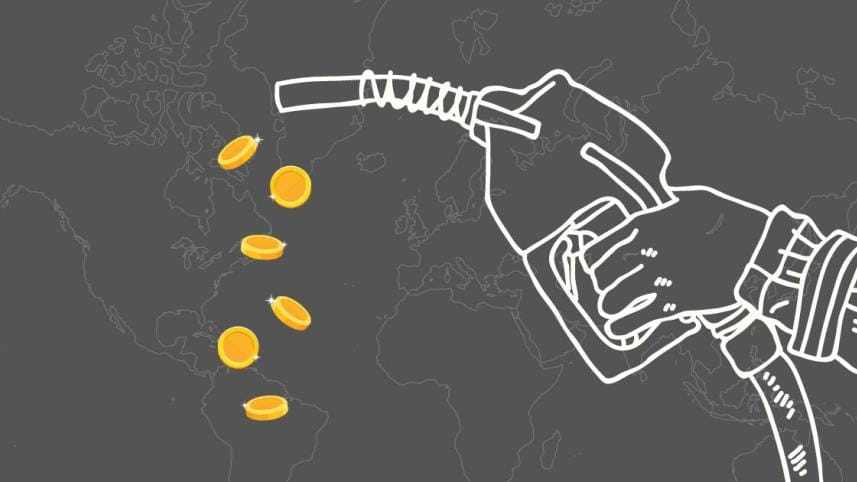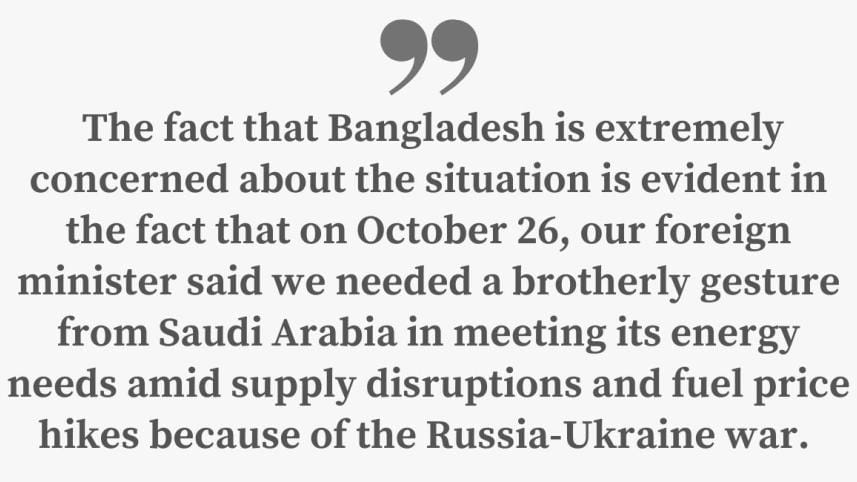How can Bangladesh circumvent the global oil war?

On October 5, the Organization of the Petroleum Exporting Countries (OPEC) and other oil-producing countries, including Russia, agreed to cut their oil production by two million barrels per day – which is two percent of the entire world's daily oil consumption. The decision by OPEC+ sparked anger in the West, the Biden administration in particular, who warned the Saudi government that its actions might be interpreted as a nod of support to Russia.
The production cut raises oil prices globally to Russia's advantage, which ultimately strikes at European and US efforts to sanction Russia. It also strikes directly at US policy efforts to short-circuit inflation at home, and will likely worsen global inflation. According to the head of the International Energy Agency (IEA), tightening markets for liquefied natural gas (LNG) worldwide and major oil producers cutting supply have put the world in the middle of "the first truly global energy crisis."
So why did the oil-exporting countries decide to do so?
It is because, at the beginning of 2022, Brent prices were close to USD 79 per barrel. After Russia's invasion of Ukraine in February, it suddenly increased to USD 110 per barrel (the highest mark in the last 14 years). In July, we started to see a general reduction in oil price, and by the end of September, it fell to USD 85 per barrel, which was very close to the price before the Russia-Ukraine war. This is when some people thought things were normalising. But the problem was that, in 2021, oil prices rose significantly from before because the world economy had just started to recover from the pandemic. Thus, USD 85 per barrel was already an inflated price from the pre-pandemic levels. In fact, immediately after the pandemic, oil prices shot up from nearly USD 20 per barrel to USD 85 per barrel. And after the war started, it increased even more.
So, from the perspective of oil producers, USD 85 per barrel in 2021 was great because it was a big increase from the Covid months. But right now, prices are declining from what it was when the war started, and oil producers are concerned that if this decline continues, and then the world goes into a recession as expected, just like when oil prices declined to USD 20 during the pandemic, the demand for oil will go down and they will have to sell oil at the extremely low price of USD 20-30. This is why OPEC+ cut their production by two percent.
Because of the oil price hike since February, Russia actually made more money after the war broke out than it did before. Russia's oil and gas revenue from Europe in normal years between March and July was USD 50 billion. But in 2022, its revenue earnings nearly doubled to USD 90 billion.
To circumvent this, the European Union (EU) has deployed the "price cap strategy" against Russian oil – which could possibly be extended to the Middle East. As per this strategy, EU members will only buy Russian oil at a maximum fixed price. But then, Russia could just sell its oil to other countries. Taking that into consideration, the EU has further placed a restriction on the transport of Russian oil by sea if the price of the contract for its purchase exceeds the so-called EU "price ceiling."
According to EU Council Regulation 2022/1904, in the case of such oil being transported by ship from a third country, providing technical, financial, insurance, and other services to the vessel in question will be prohibited. And they may also not be insured by EU companies or receive funding from individuals or entities.

How does this change things?
Previously, when ships carrying Russian oil wanted to escape the sanctions, they would just lay over in China and declare the oil to be Chinese. Meanwhile, shipping companies didn't care about geopolitics as long as they were making a profit. That is how China was reportedly selling Russian oil to Europe. Thus, the EU brought in their power over insurance companies.
Insurance in the shipping industry is extremely important, because the value of a ship itself could be extremely high – notwithstanding the value of the cargo. So even though the shipping companies may not care about sanctions, they do have to care about insurance. And interestingly, an international group of 13 marine insurance groups cover approximately 90-95 percent of the world's oil shipping fleet – and this group is based in London. So now, the EU is forcing these insurance companies to not issue insurance to ships that are buying Russian oil for more than the maximum price that it sets.
How could this oil war affect Bangladesh?
First, the OPEC+ will likely continue to cut oil production, which will increase oil price, leading to recessions in the US and Europe. This will affect all our trade and services with the West. Second, because of the increase in energy prices, the taka may continue to depreciate and our reserves may keep declining. And this will only exasperate our current economic problems. Last, if the US and EU succeed in capping oil price, we will actually benefit, because we will get oil at cheaper prices.
So, should Bangladesh just sit and hope for the latter outcome? No. The fact that Bangladesh is extremely concerned about the situation is evident in the fact that on October 26, our foreign minister said Bangladesh needed a brotherly gesture from Saudi Arabia in meeting its energy needs amid supply disruptions and fuel price hikes because of the Russia-Ukraine war. Therefore, the government should immediately get into negotiations with energy-exporting countries to come up with arrangements that are favourable for Bangladesh.
Meanwhile, the Bangladesh Petroleum Company (BPC) should cut fuel prices since it has been making a profit since August this year – as the Centre for Policy Dialogue (CPD) recently recommended – to make sure that Bangladeshi businesses do not keep suffering from the increased production costs. Since businesses are well aware of the uncertainties that lie ahead, giving them a break by cutting energy prices could boost business and consumer confidence which, at this juncture, could prove to be of great benefit for our economy.
Eresh Omar Jamal is assistant editor at The Daily Star. His Twitter handle is @EreshOmarJamal




 For all latest news, follow The Daily Star's Google News channel.
For all latest news, follow The Daily Star's Google News channel. 


Comments